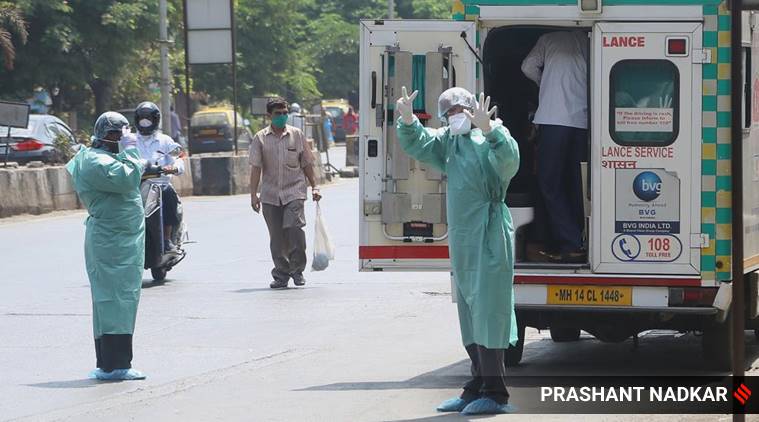 MCGM medical staff at Dawari nagar, in Mumbai’s Santacruz area.
MCGM medical staff at Dawari nagar, in Mumbai’s Santacruz area.
The COVID-19 pandemic will not stop due to a lockdown, and continue to spread, said Dr Richard A Cash, public health researcher at the Department of Global Health at the Harvard T H Chan School of Public Health. Dr Cash has worked on infectious disease issues in South Asia for over 50 years.
“India should take into account its demography and resources and not try to mimic other systems,” Dr Cash said during a webinar on the response to COVID-19 in South Asia.
In India, imposing a lockdown and forcibly keeping people from physical contact is very difficult as a large percentage of India’s workforce comprises daily wage labourers. He, however, praised Kerala’s efforts to limit the spread and said the state has done a remarkable job.
The webinar was moderated by Professor Vikram Patel, professor in the Department of Global Health and Population, Harvard TH Chan School of Public Health, who pointed out that lives of billions of people around the world have been upended by the COVID-19 virus. Nowhere was this more true than in South Asia, where more than a billion people have been under a lockdown, ranked as the most stringent in the world, for nearly four weeks now, he said.
This webinar looked at key issues such as the tension between saving lives and saving livelihoods, the continuing challenge of accurately counting the numbers of people infected which, due to enormous variations in current approaches to testing, has meant that it is difficult if not impossible, to compare the estimates across time and space.
“One simple example is that the more you test, the more you will find, and thus it is unclear to what extent the higher or lower numbers of those identified with the infection are simply a reflection of the numbers of tests carried out. How prepared is the region now in order to address future surges and clusters of cases as the lockdown is lifted? At the same time, how can the lives of those whose livelihoods have been shattered be rebuilt? How can we prevent the deaths of hunger and despair which loom on the horizon,” said Dr Patel.
Countries like Taiwan have responded aggressively as they have had previous experience with SARS outbreak and hence they initiated early screening, early isolation , contact tracing and early containment of the virus. “Unfortunately, by the time US responded, the pandemic was well established,” said Dr Cash.
Countering his approach to India – that it should not have followed the same pattern of lockdown like other countries — Dr Srinath Reddy, president of Public Health Foundation of India (PHFI), who participated in the webinar, said no lockdown is cent per cent successful.
“The decision for a lockdown was not an easy one and it is a case of damned if you do and damned if you don’t. While there will be a spillover of cases, at least this lockdown has helped reduce the infection spread rate. “The syndromic surveillance of households has not shown a major case load,” Dr Reddy said. He said another takeaway was that the tone and tenor of political debate had softened and Centre and states were unanimous in their approach to prevent COVID-19.